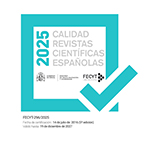Consensus as a synecdoche and consensus as a sign. A critique of Rorty’s conception of truth, justification, and consensus
Abstract
In this essay I shall propose a theoretical model that will help us to understand the meaning and scope of rational agreements. I build this model from a previous conception of the relationship between truth and justification. With this model at hand, that I shall call “agreement as a sign”, it is possible to asses Rorty´s ethnocentric claim according to which any rational agreement that a human community could reach, included scientific communities, can only refer to its idiosyncratic beliefs and to its internal ways of justifying them without reference to reality. Against the background of the “agreement as a sign” model, Rorty´s model of agreements can be seen as a case of synecdoche.Downloads
Article download
License
In order to support the global exchange of knowledge, the journal Revista de Filosofía is allowing unrestricted access to its content as from its publication in this electronic edition, and as such it is an open-access journal. The originals published in this journal are the property of the Complutense University of Madrid and any reproduction thereof in full or in part must cite the source. All content is distributed under a Creative Commons Attribution 4.0 use and distribution licence (CC BY 4.0). This circumstance must be expressly stated in these terms where necessary. You can view the summary and the complete legal text of the licence.












